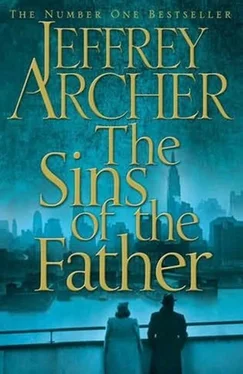Within a year, Hugo had resorted to borrowing money from friends, and even friends of friends. But when you don’t have any means of repaying your debts, you are quickly dropped from most dinner-party guest lists, and are no longer invited to join country-house shooting parties at the weekend.
Whenever he was desperate, Hugo would ring his mother, but not until he was sure his father was at the office. Mama could always be relied on for a tenner, just as she’d been for ten bob when he was at school.
An old school chum, Archie Fenwick, was also good for the occasional lunch at his club or an invitation to one of his fashionable Chelsea cocktail parties. And that was where Hugo first met Olga. It wasn’t her face or figure that immediately attracted his attention, but the pearls, three rows of them, that were draped around her neck. Hugo cornered Archie and asked if they were real.
‘They most certainly are,’ he said. ‘But be warned, you’re not the only person hoping to dip your paw into that honey pot.’
Olga Piotrovska, Archie told him, had recently arrived in London, having escaped from Poland after the German invasion. Her parents had been taken away by the Gestapo, for no other reason than that they were Jewish. Hugo frowned. Archie wasn’t able to tell Hugo much more about her, except that she lived in a magnificent townhouse on Lowndes Square and possessed a fine art collection. Hugo had never taken a great deal of interest in art, but even he’d heard of Picasso and Matisse.
Hugo strolled across the room and introduced himself to Miss Piotrovska. When Olga told him why she’d had to leave Germany, he expressed outrage and assured her that his family had been proud to do business with the Jews for over a hundred years. After all, his father, Sir Walter Barrington, was a friend of the Rothschilds and the Hambros. Long before the party was over, he had invited Olga to join him for lunch at the Ritz the following day, but as he was no longer allowed to sign the bill, he had to cadge another fiver from Archie.
The lunch went well, and for the next few weeks Hugo courted Olga assiduously, within the limits of his resources. He told her that he’d left his wife after she’d admitted having an affair with his best friend, and he’d asked his lawyer to instigate divorce proceedings. In fact, Elizabeth had already divorced him, and the judge had awarded her the Manor House, and everything Hugo hadn’t removed after he’d left in such a hurry.
Olga was very understanding, and Hugo promised her that the moment he was free, he would ask her to marry him. He never stopped telling her how beautiful she was and how her rather lifeless efforts in bed were so exciting compared to Elizabeth. He continually reminded her that when his father died, she would become Lady Barrington, and his temporary financial difficulties would be resolved when he inherited the Barrington estate. He may have given her the impression that his father was a lot older and less robust than he actually was. ‘Fading fast’ was the expression he used.

A few weeks later Hugo moved into Lowndes Square, and over the next few months he returned to a lifestyle he assumed was his by right. Several chums commented on how lucky he was to have the company of such a charming and beautiful woman, and some of them couldn’t resist adding, ‘And she’s not short of a bob or two.’
Hugo had almost forgotten what it was like to eat three meals a day, wear new clothes and be chauffeured around town. He paid off most of his debts, and it wasn’t too long before doors began to reopen that had until recently been slammed in his face. However, he was beginning to wonder how long it could last, because he certainly had no intention of marrying a Jewish refugee from Warsaw.

Derek Mitchell climbed on board the express train from Temple Meads to Paddington. The private detective was back working full time for his old employer, now that his stipend was once again paid on the first day of the month, and his expenses were redeemed on presentation. Hugo expected Mitchell to report to him once a month on what the Barrington family were up to. In particular, Hugo was interested in the comings and goings of his father, his ex-wife, Giles, Emma and even Grace, but he was still paranoid about Maisie Clifton, and expected Mitchell to brief him on everything she got up to, and he meant everything.
Mitchell would travel to London by train, and the two of them would meet in the waiting room opposite platform seven at Paddington Station. An hour later Mitchell would take the train back to Temple Meads.
That was how Hugo knew that Elizabeth continued to live at the Manor House, while Grace rarely came home since she’d won a scholarship to Cambridge. Emma had given birth to a son, whom she’d christened Sebastian Arthur. Giles had enlisted in the Wessex Regiment as a private soldier, and after completing a twelve-week basic training course, had been sent to Mons Officer Cadet Training Unit.
This came as a surprise to Hugo, as he knew Giles had been passed unfit for active service by the Gloucesters shortly after the outbreak of war, because, like him and his father, he was colour-blind. Hugo had used the same excuse to avoid being called up in 1915.

As the months passed, Olga began to ask more and more frequently when Hugo’s divorce would be finalized. He always tried to make it sound as if it were imminent, but it wasn’t until she suggested he move back into his flat in Cadogan Square until he could confirm that papers had been lodged with the court that he decided to do something about it. He waited another week before he told her his lawyers had begun proceedings.
A few more months of domestic harmony followed. What he hadn’t told Olga was that he’d given his landlord in Cadogan Square a month’s notice on the day he moved in with her. If she threw him out, he would have nowhere to live.

It was about a month later that Mitchell phoned Hugo and said he needed to see him urgently, a most unusual request. They agreed to meet at four o’clock the following afternoon at their usual rendezvous.
When Mitchell walked into the station waiting room, Hugo was already sitting on a bench, hidden behind a copy of the London Evening News . He was reading about Rommel’s sacking of Tobruk, not that he could have placed Tobruk on a map. He continued reading when Mitchell sat down beside him. The private detective spoke softly and never once looked in Hugo’s direction.
‘I thought you’d want to know that your eldest daughter took a job as a waitress at the Grand Hotel, using the name Miss Dickens.’
‘Isn’t that where Maisie Clifton works?’
‘Yes, she’s the restaurant’s manageress, and was your daughter’s boss.’
Hugo couldn’t imagine why Emma could possibly want to work as a waitress. ‘Does her mother know?’
‘She must, because Hudson dropped her a hundred yards from the hotel every morning at five forty-five. But that isn’t the reason I needed to see you.’
Hugo turned the page of his newspaper to see a photograph of General Auchinleck standing outside his tent in the desert, addressing the troops.
‘Your daughter took a taxi to the docks yesterday morning. She was carrying a suitcase, when she boarded a passenger ship called the Kansas Star , where she was given a job in reception. She told her mother she was going to New York to visit her great-aunt Phyllis, who I believe is Lord Harvey’s sister.’
Читать дальше
















